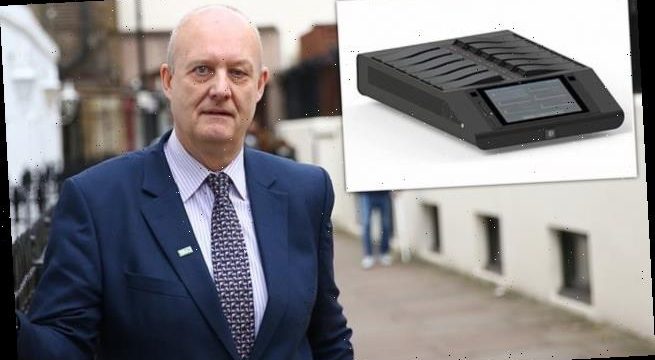A coronavirus test that takes 20 minutes to diagnose people could allow relatives to visit loved ones in care homes for the first time in months, England’s care boss says
- Martin Green – chief executive of Care England – said testing access was ‘patchy’
- Told MPs to look to emerging technologies and get away from central approach
- He highlighted potential of machine that diagnoses people in 20 minutes
- Here’s how to help people impacted by Covid-19
A Covid-19 test which gives a diagnosis in 20 minutes could allow relatives to visit loved ones in care homes, England’s care boss has said.
Martin Green – chief executive of Care England – told MPs today that ‘patchy’ access to swabs had deprived care home residents from seeing their families for months.
He urged the Government to look to emerging technologies and move away from the top-down testing approach the Government has been widely criticised for throughout the crisis.
Care homes shut their doors in March and blocked external visitors in a bid to shield vulnerable residents from catching the disease which is particularly deadly for elderly people.
But a lack of testing saw the NHS turf out patients infected with the virus into the care sector, allowing it to race through homes and kill one in 16 of all residents in England and Wales.
The same shortage of swabs meant only healthcare staff and people with symptoms can get access to a coronavirus test at the beginning of the crisis.
Mr Green highlighted the potential of a rapid on-the-spot Covid test currently being piloted on thousands of patients in Hampshire.
He said turning to new testing methods could allow families and care home residents to reunite. Mr Green also stressed the need for regular testing for any system to be effective.
Martin Green – chief executive of Care England – told MPs today that q Covid-19 test which gives a diagnosis in 20 minutes could allow relatives to visit loved ones in care homes
The Covid-19 LAMP assay test, developed by UK-based manufacturer Optigene, can turn around results within 20 minutes
Professor Green told the House of Commons Health and Social Care Committee today: ‘I think we’ve got to get testing as part of an ongoing programme – it is not a once-in-a-lifetime activity, it’s something that needs to happen regularly.
‘I also want to see, for example… there is one programme going on in Hampshire at the moment where you can get test results within about 20 minutes.
‘Now what we need is that testing rolled out because that will also help us not only be able to test staff and residents, but also to be able to test relatives who might want to visit.’
Some care homes have started to reopen to visitors but under strict rules only.
Care UK, for example, runs more than 100 care homes with a total of over 7,000 residents and has started to allow outdoor visits at homes that have been coronavirus-free for at least two weeks.
Only adults are allowed to visit, all are screened on arrival, and visits are limited to 30 minutes without any physical contact, in a desperate bid to stop the virus re-entering homes.
Testing could allow homes to offer more visits and potentially to have looser rules, Professor Green suggested.
The Covid-19 LAMP assay test, developed by UK-based manufacturer Optigene, can turn around results within 20 minutes.
The trial of the rapid swab test began in Hampshire last month after it proved effective in clinical settings.
The swab test is being used in a number of A&E departments, GP testing hubs and care homes in the county.
Coronavirus has killed one in 16 care home residents in England and Wales, analysis reveals
Coronavirus has killed one in 16 care home residents in England and Wales, fresh research suggests.
Analysis by the Telegraph points to shocking figures of people who have lost their lives as a result of the spread, with data showing there have been 26,211 excess deaths in care homes since the start of the outbreak, compared to the five-year average for the same period.
While coronavirus is believed to be the main driving factor behind the rise in deaths, it is understood the mass disruptions to normal care home service as a result of the pandemic has also led to people losing their lives.
There were 411,00 people living in care homes in England and Wales and the data shows that more than six per cent – or one in 16 – has died since the spring.
Current PCR tests take 48-72 hours to produce a result because they need to be sent to a laboratory and processed at different temperatures.
But the loop-mediated isothermal amplification (Lamp) swab can be processed on site.
Announcing the trial in May, Health Secretary Matt Hancock said: ‘This new test could provide accurate results almost on the spot.
‘This could change the way that we control Covid-19 across the country, getting those with negative results back into society as quickly as possible.’
MPs also heard that care home and domiciliary care staff feel like the ‘underdogs and the Cinderellas’ compared with members of the NHS, and that testing of staff in home care settings has been limited.
Jane Townson, chief executive at the UK Homecare Association, told MPs: ‘Because testing capacity has been limited, home care has been at the bottom of the priority list so people receiving home care were never even on the list.’
More than one in three care homes in the country have suffered outbreaks of Covid-19.
The Government’s policy for testing in care homes during the peak of the outbreak, was to test a small sample in the home and, if positive cases were found, to assume there was an outbreak in the home and automatically classify other people with similar symptoms as coronavirus patients. Widespread testing only became available in April.
A report by the National Audit Office (NAO), the Government’s spending watchdog, said the homes were overlooked in order to protect the NHS.
The first independent review of preparations for the pandemic counted that 25,000 patients were discharged from hospitals into the sector between March 17 and April 15 without testing them for the coronavirus. The peak of coronavirus deaths in hospitals in England was on April 8.
Care home residents are at a much higher risk than the general public of dying if they catch the coronavirus because it is more deadly for older people.
Higher rates of other health conditions affecting the heart, lungs and brain, and general frailty, are thought to be to blame.
It is also harder to contain the virus in care homes because many people are unable to live independently so rely on regular close contact with workers, who often care for multiple people at a time.
Cases are also thought to be harder to detect because residents are often ill with other conditions with similar symptoms, and may not show typical signs of Covid-19.
Source: Read Full Article


